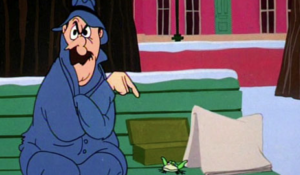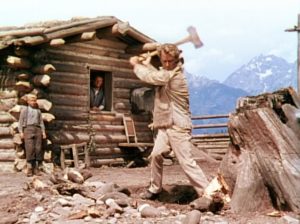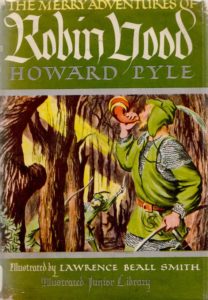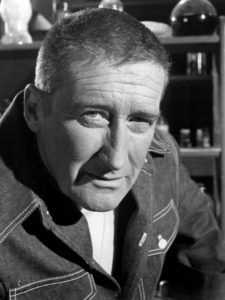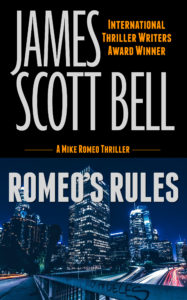What’s your favorite cartoon or cartoon character?
Author Archives: James Scott Bell
How to Mess Up Your Lead Character’s Ordinary Day
by James Scott Bell
@jamesscottbell
 On the first page (preferably in the first paragraph or even first line) of a novel, I want to see a disturbance to a character’s ordinary world. It can be subtle, like a midnight knock on the door (The Pilot’s Wife by Anita Shreve). Or extreme, like a ticking bomb (Final Seconds by John Lutz and David August).
On the first page (preferably in the first paragraph or even first line) of a novel, I want to see a disturbance to a character’s ordinary world. It can be subtle, like a midnight knock on the door (The Pilot’s Wife by Anita Shreve). Or extreme, like a ticking bomb (Final Seconds by John Lutz and David August).
What I don’t want is “Happy People in Happy Land” (HPHL). I’ve seen a few of these openings in my time, mainly in domestic settings. The happy family getting ready for the day, etc. The author thinks: If I show these really nice people being really nice, the reader will care about them when the trouble starts.
But we don’t. We start to care about characters when trouble—or the hint of it—comes along, which is why, whenever I sign a copy of Conflict & Suspense, I always write, Make trouble!
Now, there are two ways to disturb HPHL in the opening. One is something happening that is not normal, as I mentioned above. It’s an “outside” disturbance, if you will.
But there’s another way, from the “inside.” You can give us a character’s ordinary day as it unfolds—while finding a way to mess it up.
That’s the strategy Michael Crichton uses in his 1994 novel, Disclosure (made into a movie with Michael Douglas and Demi Moore).
The plot centers around Tom Sanders, an mid-level executive at a thriving digital company in Seattle. He’s married to a successful lawyer named Susan. They live in a nice house on Bainbridge Island, with their four-year-old daughter and nine-month-old son.
As the book opens, we learn that Sanders expects this to be a good day. He’s sure he’s going to be promoted to head of his division, which will set him up for a windfall of millions after an expected merger and IPO. So it’s essential he get to the office on time.
Crichton is not going to let that happen. Here’s the first paragraph:
Tom Sanders never intended to be late for work on Monday, June 15. At 7:30 in the morning, he stepped into the shower at his home on Bainbridge Island. He knew he had to shave, dress, and leave the house in ten minutes if he was to make the 7:50 ferry and arrive at work by 8:30, in time to go over the remaining points with Stephanie Kaplan before they went into the meeting with the lawyers from Conley-White.
So Tom is in the shower when—
“Tom? Where are you? Tom?”
His wife, Susan, was calling from the bedroom. He ducked his head out of the spray.
“I’m in the shower!”
She said something in reply, but he didn’t hear it. He stepped out, reaching for a towel. “What?”
“I said, Can you feed the kids?”
His wife was an attorney who worked four days a week at a downtown firm.
So now he’s got to feed the kids? He hasn’t got time! But that’s life with two working parents, so he quickly begins to shave. Outside the bathroom, he hears his kids starting to cry because Mom can’t attend their every need. Crichton stretches out this sequence. Even something as innocuous as shaving can be tense when the kids are wailing.
Tom finally emerges from the bathroom, with only a towel around him, as he scoops up the kids to feed them.
Susan called after him: “Don’t forget Matt needs vitamins in his cereal. One dropperful. And don’t give him any more of the rice cereal, he spits it out. He likes wheat now.”
She went into the bathroom, slamming the door behind her.
His daughter looked at him with serious eyes. “Is this going to be one of those days, Daddy?”
“Yeah, it looks like it.”
Exactly!
He mixed the wheat cereal for Matt, and put it in front of his son. Then he set Eliza’s bowl on the table, poured in the Chex, glanced at her.
“Enough?”
“Yes.”
He poured the milk for her.
“No, Dad!” his daughter howled, bursting into tears. “I wanted to pour the milk!”
“Sorry, Lize—”
“Take it out— take the milk out—” She was shrieking, completely hysterical.
“I’m sorry, Lize, but this is—”“I wanted to pour the milk!” She slid off her seat to the ground, where she lay kicking her heels on the floor. “Take it out, take the milk out!”
Every parent knows how true to life this is. A four-year old has definite ideas on their routine, and what they want to control!
“I’m sorry,” Sanders said. “You’ll just have to eat it, Lize.”
He sat down at the table beside Matt to feed him. Matt stuck his hand in his cereal and smeared it across his eyes. He, too, began to cry.
Can’t you just picture this?
Sanders got a dish towel to wipe Matt’s face. He noticed that the kitchen clock now said five to eight. He thought that he’d better call the office, to warn them he would be late. But he’d have to quiet Eliza first: she was still on the floor, kicking and screaming about the milk.
“All right, Eliza, take it easy. Take it easy.” He got a fresh bowl, poured more cereal, and gave her the carton of milk to pour herself. “Here.”
She crossed her arms and pouted. “I don’t want it.”
“Eliza, you pour that milk this minute.”
Throughout the scene he’s looking at the clock, trying to gauge how late he will be. At the end of the chapter, Susan has finally come to Tom’s rescue, and says—
“I’ll take over now. You don’t want to be late. Isn’t today the big day? When they announce your promotion?”
“I hope so.”
“Call me as soon as you hear.”
“I will.” Sanders got up, cinched the towel around his waist, and headed upstairs to get dressed. There was always traffic before the 8:20 ferry. He would have to hurry to make it.
End of chapter. We want to read on. After what this guy’s been through just to get ready for work, we hope he’s day’s going to get better.
It’s not, of course. This is Michael Crichton. Things are about to get a whole lot worse for Mr. Tom Sanders.
This strategy will work whether you open in a home or office; in a car or on a boat; in a coffee house or Waffle House.
Just decide to be mean. Mess up your character’s day.
Do you have happy people at the beginning of your manuscript? What can you do on page one to make sure they don’t stay happy?
Reader Friday: Unforgettable Scenes
Mastering the Four Modes of Fiction
by James Scott Bell
@jamesscottbell
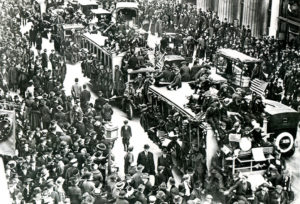 Today’s first-page critique gives us an opportunity to cover the most important large-scale issue every new writer needs to understand before setting out to write a novel. I’ll explain after we read our submission.
Today’s first-page critique gives us an opportunity to cover the most important large-scale issue every new writer needs to understand before setting out to write a novel. I’ll explain after we read our submission.
Appointment in Moscow
Chapter 1 – Covert Landing
Her code name was Mayflower and her mission was to crack the vault at the White House. It would have been a dangerous assignment for anyone, much less a neophyte with no formal training in espionage, but Mayflower’s handlers in Moscow had seen to it that she was briefed, photographed, fingerprinted, outfitted, inoculated, weighed, coiffed and for good measure given a palm reading by a politically reliable seer. All that aside, her late husband, Frederick, had been a career intelligence officer and she had picked up a good bit of tradecraft from him. Her confidence was high.
Mayflower had arrived in New York yesterday from Russia on a passenger liner out of neutral Norway, a voyage fraught with storms, U-boat scares and truly awful food at the captain’s table. She felt better now as she stepped down off the train into Union Station in Washington, a place that brought back fond memories of when she and Freddie had lived in the capital. This was the fourth year of what the press was calling the World War, and the platform was packed with military police and railroad officials frantically trying to maintain order. People were running, shoving, shouting, arguing, pleading. Names were called out over the loudspeakers as babies squalled, kids tap-danced for pennies, a Four-Minute Man gave a victory speech, and a man wearing a dusty black suit and a dirty white clerical collar staggered through the crowd warning that the end was near.
“Bible, lady?” he said, breathing whisky fumes on her. “It’s 1918 already and Armageddon is coming. Read all about it. Only six bits.”
Mayflower took a Bible from the box under his arm and handed him a dollar bill. “Come with me, I need your help,” she told him. “And please hold the sermon. I’m a deist.”
“Disciples of Christ, myself,” he said. “At your service, ma’am.”
She took his arm and moved him in front of her as a shield and they started walking. When she was a young woman locked up in a Catholic boarding school she had learned a number of ways to sneak out late at night. She intended to use that experience and make a discreet exit here out a service door. But her plan was interrupted by two uniformed cops who directed the incoming passengers into a gauntlet of detectives and government agents holding wanted fliers. They looked everybody over, comparing faces with photos.
***
JSB: I’m not going to micro-critique this page, because there is one huge lesson the writer must take away from this, and that is how to distinguish between, and artfully use, the four modes of fiction. Once that is understood, the writer must then practice, practice. Indeed, this is going to be your task the rest of your writing life (as it is for all of us!)
What do I mean by the four modes of fiction? Just this: there are four ways to convey “story stuff” to the reader: scene, summary, exposition, and backstory. You need to know what each of these does, and when to use them.
Let’s define them first.
Scene is the action on the page. In movie terms, it would be what you see onscreen, and what you hear in dialogue. It’s the show part of show, don’t tell.
Summary is a narrative recounting of action in order to transition to another scene, or to cover a long period that would be too cumbersome to show. Thus, it’s the tell part of show, don’t tell. (There are other “tells” in fiction, but that’s another topic).
Exposition is story information delivered to the reader. Such information is usually about a setting (description, history, social life) or a character (description, skills, education).
Backstory is history relating to the characters or plot, something that happened before the novel begins. A flashback is all backstory, but sometimes backstory bits are dropped in as part of the narrative.
So here’s today’s question: Which mode should the novelist specialize in, especially in the opening pages?
**Jeopardy music**
If you said scene, you move on to the championship round. Readers want scenes. They will tolerate the other modes so long as they are in service to the scenes.
With that in mind, let’s unpack this page.
Her code name was Mayflower and her mission was to crack the vault at the White House. It would have been a dangerous assignment for anyone, much less a neophyte with no formal training in espionage, but Mayflower’s handlers in Moscow had seen to it that she was briefed, photographed, fingerprinted, outfitted, inoculated, weighed, coiffed and for good measure given a palm reading by a politically reliable seer. All that aside, her late husband, Frederick, had been a career intelligence officer and she had picked up a good bit of tradecraft from him. Her confidence was high.
[This paragraph is not a scene. It is all exposition and backstory. You, the author, are simply telling us these things. There is nothing happening “onscreen.” It is essential that you understand this. Here’s a tip: If you use the word had you are indicating backstory.]
Mayflower had arrived in New York yesterday from Russia on a passenger liner out of neutral Norway, a voyage fraught with storms, U-boat scares and truly awful food at the captain’s table.
[See that had? Backstory!]
She felt better now as she stepped down off the train into Union Station in Washington,
[This is the first bit of action, and the start of a scene]
a place that brought back fond memories of when she and Freddie had lived in the capital.
[Had! Backstory!]
This was the fourth year of what the press was calling the World War,
[Exposition. This is the author telling us the information.]
and the platform was packed with military police and railroad officials frantically trying to maintain order. People were running, shoving, shouting, arguing, pleading. Names were called out over the loudspeakers as babies squalled, kids tap-danced for pennies, a Four-Minute Man gave a victory speech, and a man wearing a dusty black suit and a dirty white clerical collar staggered through the crowd warning that the end was near.
[This is exposition in the form of description. Now, description is necessary to set a scene, but it’s more effective if you filter it through the point-of-view character. For example, have a running person bump into her. Have her ears hurt from the loudspeaker, etc.]
“Bible, lady?” he said, breathing whisky fumes on her. “It’s 1918 already and Armageddon is coming. Read all about it. Only six bits.”
[Scene! Dialogue between characters is always a scene. That’s why it’s perfectly acceptable to start a novel with dialogue. Indeed, this would be a good place to start this page. However, notice that exposition slipped into the dialogue. Would this guy really tell her it’s 1918? Everybody knows it’s 1918. Many new writers do this, especially in opening pages. They want the readers to know certain information, and try to “hide” it in the dialogue:
“Oh hello, Stan, my family doctor. Nice to see you.”
Here’s a simple solution. If, and only if, the exposition is essential, put it into more confrontational language:
“Bible, lady?”
“No, thank you.”
“Armageddon’s coming!”
“Excuse me.”
Mayflower tried to move past the man but he stepped in front of her.
“Save yourself,” he said. “The world ends before the year is out!”
“Tush.” She brushed past him, through the fog of his whiskey breath, and headed down the street.
“You’ll never see 1919!” he shouted. “And where will you spend eternity?”]
Mayflower took a Bible from the box under his arm and handed him a dollar bill. “Come with me, I need your help,” she told him. “And please hold the sermon. I’m a deist.”
“Disciples of Christ, myself,” he said. “At your service, ma’am.”
She took his arm and moved him in front of her as a shield and they started walking.
[Scene. The expositional dialogue “I’m a deist” is at least in a bit of confrontation.]
When she was a young woman locked up in a Catholic boarding school she had learned a number of ways to sneak out late at night.
[Had! Backstory.]
She intended to use that experience and make a discreet exit here out a service door. But her plan was interrupted by two uniformed cops who directed the incoming passengers into a gauntlet of detectives and government agents holding wanted fliers. They looked everybody over, comparing faces with photos.
[This is summary. You’re summarizing the action, not showing it to us on the page. Here’s the difference:
A cop put up his hand. “That’s far enough, lady.”
“Excuse me,” Mayflower said. “I’m not one of the—”
“We got orders,” the cop said.
He looked at some papers in his hand, one by one. Mayflower strained to see what they were. She caught a glimpse of face under big block lettering. A wanted poster?
The cop looked Mayflower in the eye. “Let’s see somethin’ with your name on it,” he said.]
From all this, draw the following lessons:
- Learn to identify in what mode of fiction you are writing at any given time. You can learn by analyzing other novels, page by page. Use four different colored highlighters. Teach yourself.
- Start your book with a scene.
- Filter exposition and description through the POV character. Here’s how Robert Crais opens Demolition Angel:
Charlie Riggio stared at the cardboard box sitting beside the Dumpster. It was a Jolly Green Giant box, with what appeared to be a crumpled brown paper bag sticking up through the top. The box was stamped Green Beans. Neither Riggio or the two uniformed officers with him approached closer than the corner of the strip mall there on Sunset Boulevard; they could see the box fine from where they were.
If you read on, you’ll see Crais majoring in scene (primarily through dialogue) with occasional exposition/description through Riggio’s eyes.
- Use backstory sparingly in the early pages. I have a little exercise I give new writers: three sentences of backstory in the first 2500 words, all together or spread out. Three paragraphs of backstory in the next 2500 words, all at once or spread out. This is not a “rule” but simply a way to practice and get disciplined about writing in scenes.
We are now open for comments.
Reader Friday: Childhood Reading
How to Make Good Dough Self Publishing
by James Scott Bell
@jamesscottbell
Recently, Amazon’s paperback publishing unit, CreateSpace, sent out an email confirming that CSP was merging with Kindle Direct Publishing. All print-on-demand services are now under the KDP umbrella.
Nothing earth-shattering in all this, just a switch of platforms. Shouldn’t be a big adjustment.
What caught my eye, however, was a line at the end of the letter. Amazon is famously tight with their data, so it was interesting to find this little ditty:
As Amazon’s recent shareholder letter noted, there are more than 1,000 authors who earn more than $100,000 a year from their work with us.
That’s good to know. Because at one time (back in the “gold rush” days of self-publishing, roughly 2009-2012) the vibe was that virtually anybody could make six figures if they wrote fast enough and in the right genre. That was a myth, of course, but like all myths it had a toe-hold in the truth. Some previously unpublished writers, like Amanda Hocking and Hugh Howey, did strike gold. Some traditionally-published midlist writers, like Joe Konrath and Brett Battles, hopped in and hit it big. There were even a few, like Bella Andre, who scorched into eight figures.
So everyone wanted to know who was making what via self-publishing. Some authors gave out their numbers. But that small sample size couldn’t tell the whole story. Then Hugh Howey and the mysterious “Data Guy” started their Author Earnings reports, which scraped hard data out of Kindle sales rankings. And yes, indeed, a lot of indie writers were doing very, very well.
AE is now dormant, having transitioned into Bookstat.com, a pricey service for companies whose “annual revenues are $10 million or more.” But the final AE report showed that while the gold rush days (such as they were) are gone, indie publishing is here to stay.
But it wasn’t until I saw that Amazon number—1,000 making over $100,000—that I was able to get a feel for how many authors are in that zone. (We must note that Amazon’s number would include non-fiction as well.)
Now, if a thousand indie authors are making six figures a year, I would venture to say that a substantially higher number are in the fives. Very few fiction writers of the past ever made it there. That’s why I continue to say it’s the best time on Earth to be a writer.
Of course, the admonition, “Your mileage may vary” is more apt in the writing game than anywhere else. There are so many variables at play that no two writers will ever come out the same in terms of method, production, and income.
But there are ways of increasing your odds of monetary success, just as there are fundamentals in any entrepreneurial endeavor. And that’s what self-publishing is, after all.
Written Word Media conducted a survey comparing authors who make over $100,000 a year (“100kers”) and those earning less than $500 a year (optimistically called “EAs” for Emerging Authors). Some interesting results here, including:
- Indie authors dominated the 100k club.
We wanted to know if there was any correlation between how an author was published and whether or not it got them to the 100k club. The results were pretty surprising to us. Of all 100kers none were purely traditionally published. To be fair, only about 5% of overall respondents were solely traditionally published (James Patterson did not take our survey), so traditionally published authors didn’t make up a big part of the surveyed audience, but none of them were in the 100K club.
Of the 100kers surveyed, 72% were indie and 28% were hybrid. Publishing independently rewards authors with higher royalty rates which means it is easier to start generating meaningful revenue when you self publish. The Author Earnings reports are showing a trend in which indie authors are taking share from traditional publishing, despite the fact that titles of indie books are priced lower than traditionally published titles.
- 100kers spend more on covers and professional editing.
No surprise there.
- It takes time. 88% of 100kers have been at this for 3 years or longer.
Indie publishing is no get-rich-quick scheme. In the traditional world they used to say it took 3-5 books to establish an author. Unfortunately for writers who have entered the Forbidden City, that number is now only 1-2.
- 100kers use paid marketing (e.g., deal alert sites like BookBub; paid ads with Amazon and Facebook) more than social media marketing.
That’s because social media does not sell a lot of books.
- Being prolific matters.
From the survey:
Emerging Authors spent 19.8 hours per week writing, compared to 100Kers who spent 28.6 hours per week writing. That’s a 46% increase! The 100kers write a lot more than the emerging authors.
To this list, let me add my own advice:
We should all know this by now, but it bears repeating: far and away, the best and most ubiquitous marketing tool is word-of-mouth. And that is generated by, gasp, writing books that are so good people talk about them.
Which is what TKZ is all about—helping writers get better. It’s something you should want to do anyway, if you’re a real writer.
- Think like a publisher
You need to put your projects through an analysis like a pub board at a traditional house would. Who is going to buy your book? Is there an audience for your genre? How popular is the genre? Who are some other authors doing well in this area? What are they doing in terms of marketing? What can you learn from them?
Are you an author who can keep producing? In the traditional publishing world, a bestselling author used to be held to a minimum of one book a year. These days, some publishers are pushing their A-list writers to do two books a year, supplemented by a short story or two for marketing purposes.
If you worked at a publishing house that needed to make a profit, would you offer a contract to yourself?
- Establish a system of quality controls
If you self-publish, quality of production is your responsibility: editing, cover design, formatting, marketing, SEO, metadata and so on. You can learn do to some of this on your own, but other things, like cover design, you’ll want to farm out. Do your due diligence and be prepared to invest some money.
Also be prepared to review your system as each new book comes out, and make incremental changes geared toward greater quality. That’s called kaizen in business circles.
- Learn a few basic marketing skills
Even traditionally published authors have to do this, so don’t complain. As Russell Rowland recently put it:
The part that I never quite understood was the lack of support from the publisher, but it did give me a strong understanding that this is a business where you can’t rely on others to toot your horn. If they do, it’s a bonus. But marketing is up to the writer, even if you’re with a major publisher.
But beware, it is very easy to fall into the vortex of marketing frenzy, thinking you have to do every single thing possible lest you miss out on the “tipping point” of massive sales. Big mistake. Which is why I wrote a book on the tools that really work.
- Repeat, over and over, the rest of your life
You want to be a writer who makes some a good side income or maybe enough lettuce to live on? Then work hard. This is business. But if writing is what you love (and it should be, because there are plenty of opportunities to quit), then keep on writing until they pry your cold, dead fingers off the keyboard.
Do you have a “system” for your writing career? Not just how you write a book, but how you see yourself in the world of publishing and what steps you are taking to make it happen.
How Beautiful Should Your Sentences Be?
by James Scott Bell
@jamesscottbell
“Those big-shot writers could never dig the fact that there are more salted peanuts consumed than caviar.”
So said one of the all-time bestselling writers, Mickey Spillane. He was always getting bad-mouthed by literary writers (most famously Hemingway) for succeeding in the sweatshop of mass market paperback fiction. Many “big-shot writers” who wrote beautiful sentences did not take it well that this hardboiled typist was outselling them ten thousand to one.
I thought about that quote recently as I listened to an agent and editor on a panel discussing “up-market fiction.” That seems to be what “everyone is looking for” in the traditional publishing world. But what the heck is it?
A few years ago, Chuck Sambuchino, of Writer’s Digest, defined “up-market” this way:
Simply put, it’s fiction that blends the line between commercial and literary. To further examine this, let’s break down those two terms. Commercial fiction, essentially, refers to novels that fall into a typical genre (thriller, let’s say). Commercial fiction can sell very well because it usually has a tight premise/logline (“Someone is trying to kill the president!”) and people like reading a category like thrillers because it’s exciting. Literary fiction refers to novels that don’t fit into any standard genre classification – romance, mystery, sci-fi, for example. Literary fiction requires the highest command of the language. Not pretentious, over-the-top purple prose – just simply excellent writing. Literary fiction has a harder time selling because it’s not easily defined, and sometimes the premise is not easily explained (or just isn’t that exciting).
So that brings us to “upmarket.” EVERYONE is looking for this genre. “But why, Chuck?” Well, think about it. It’s literary fiction, so it’s pretty damn good writing, but it has commercial potential. It has the ability to infiltrate lots of book clubs and start discussions and take off as a product. It’s a win-win for everyone. I’ve heard a lot of agents say that they are looking for “literary fiction with a commercial appeal,” or something like that. Well, one word that does the job of those six is “upmarket,” and that’s why you hear it so much.
The article went on to quote agent Kristin Nelson, who said, “Really, editors are looking for literary writers who can tackle the more commercial themes in a way that’s fresh and well constructed.”
The agent on the panel said that literary fiction is “all about the sentences” and commercial fiction is “all about the plot.” Up-market fiction occupies “the space in between.” It has “more beautiful sentences” than raw commercial fiction.
I guess I understand. But let me say, first of all, I don’t believe a collection of “beautiful sentences” necessarily adds up to a quality literary novel. If you’d like to find out why, read the famous (or infamous, depending on your point of view) essay called A Reader’s Manifesto.
On the other hand, lovely prose in service to story can indeed elevate the fictive dream. I give you, e.g., White Oleander by Janet Fitch.
It’s an interesting balance to consider. My approach is to start with plot and then consider my sentences, rather than start with style and root around for a plot. Therefore I counsel: Don’t write to impress your readers; write to distress your characters.
When I write a sentence I don’t want it to pull the reader out of the story by being either a) clunky; or b) purple. If there’s to be some “poetry” in the prose, I want it to be, as John D. MacDonald put it, “unobtrusive.”
To bring things back to Mr. Spillane, his writing was favorably contrasted to Thomas Wolfe’s in an essay by, of all people, Ayn Rand. And it seems to me she was right. Wolfe’s sentences often get in my way (I wrote about that here). But Spillane’s pull me into the story world. Read the opening of One Lonely Night sometime.
So just to be clear, I really do love a bit of caviar now and then. But I’ll take a bag of salted peanuts anytime—and will likely finish the whole darn thing.
So what repast do you prefer—caviar or peanuts? Do you think about writing “up market”?
Fiction Is Truth Serum
by James Scott Bell
@jamesscottbell
 Driving a car in Los Angeles offers great insight into human nature.
Driving a car in Los Angeles offers great insight into human nature.
Some years ago, along a stretch of the freeway we Angelenos call The 101 (not “one-hundred-and-one” but “one-oh-one,” thank you very much) I was being harassed by the car in back of me. I had just completed what is known in driving school as a lane change. As I recall I indicated my impending move by way of the turn signal, though how much notice I gave the gentleman in the next lane I cannot remember with precision.
Quite apparently, however, he took umbrage at my action and began honking his horn, flashing his lights, and declaring his displeasure with a single, upraised digit.
I could see how red his face was via my rear view mirror.
Now, what do I do in situations like that? My first urge is to try to think of something that will frustrate the churlish driver even more. But then (I certainly hope) a “better angel of my nature” kicks me in the ribs and I try to let the whole thing pass.
This I did, and started whistling a merry tune.
The fellow behind me, though, was not satisfied. The moment he had an opening he shot over to the lane on our right (without benefit of signal), gunned his automobile, then cut in front of me (again without benefit of signal). He offered me one more look at his middle finger.
Which was when I noticed the bumper sticker on the rear of his car:
ONE PEOPLE. ONE PLANET. PLEASE.
Ah, humanity. What a study. And what a lesson for our fiction.
For who are we really? Who are our characters?
We/They are not the masks we wear when things are smooth and tidy. Or perhaps, to put it another way, what we are truly made of is only revealed under pressure.
That’s what great fiction is about—how a character transforms when forced into conflict (I contend that to be great, the conflict must be life or death—death being physical, professional, or psychological/spiritual. This includes thrillers, romance, literary…any genre).
We’re not going to read 200—or even 20—pages about a flirty girl in a big dress trying to land an aristocratic husband. Only the Civil War and the prospect of losing her home is going to show us what Scarlett O’Hara is made of.
Who is Rick Blaine, the reclusive owner of a café and gambling den in the city of Casablanca? It seems he does live his life according to one rule: “I stick my neck out for nobody.” But what happens when the Nazis show up and try to push him around? And then close in on the only woman he has ever loved—and her resistance-hero husband? The whole movie is about forcing Rick to look at himself (as if in a mirror) and figure out who he really is … and, more important, who he must become.
Think of the pressure of the novel as being truth serum for a character.
So who was in back of me in that car? A nice guy advocating for peace in the world who was having a bad day? Or a plaster saint who plays The Beatles’ “All You Need is Love” in his apartment even as he flames people with a burner account on Twitter?
The great thing about fiction is that the tests we give our characters, and who they turn out to be because of them, are infinitely variable. (Which is why I imagine my road-rage guy got off the freeway shortly after our encounter, lost control of his vehicle, slammed into a telephone pole, woke up in the hospital with amnesia and later became convinced he was Professor Irwin Corey.)
Here’s an exercise: Ask yourself what bumper sticker your character would place on his car. That’s his mask. That’s what he wants people to think of him. Then ask yourself what action the character can take that demonstrates the opposite of the sentiment. Now, what does that tell you about who the character really is?
Work that complexity into your manuscript.
And please, drive sanely.
How to Give Your Readers Unforgettable Moments
by James Scott Bell
@jamesscottbell
The legendary movie director John Huston once remarked that a great movie is comprised of “three great scenes, and no weak ones.” Not bad advice that. We don’t want any weak scenes in our fiction. But we also want those moments that reach deep into the reader’s heart.
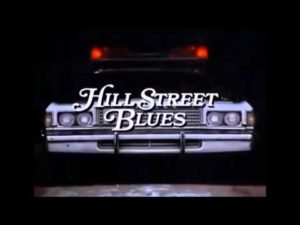 I thought about this recently while watching an early episode of the old cop drama Hill Street Blues.
I thought about this recently while watching an early episode of the old cop drama Hill Street Blues.
I didn’t watch the show religiously when it first aired, as it began the same year I started law school. I was kind of busy. What I do remember is how much I liked the central character, Francis Xavier “Frank” Furillo, played by Daniel J. Travanti. He was the right mix of tough and compassionate, and Travanti was perfect in the role.
A few weeks ago I ran across a channel specializing in vintage cop shows and started watching an episode of HSB. It was a two-parter titled “Jungle Madness.” The show had several plot lines, one involving John “J.D.” LaRue (Kiel Martin) as a cop going down the drain due to alcoholism. In Part 1, LaRue’s drinking causes an incident that might have gotten him killed. Furillo takes him aside and gets in his face. “You’re a drunk!” he says, and tells him he either admits this to a police doctor or he’ll be drummed off the force.
In Part 2, LaRue hits bottom. No money. Kicked out of bars. Alone.
At episode’s end he nervously walks into an AA meeting. The leader asks if there are any newcomers. Slowly, LaRue raises his hand. The leader asks him to please stand and tell everyone his first name.
“I’m John,” he says, “and I guess I’m an alcoholic.”
“Hi, John,” the group responds
As he’s about to sit down he hears, “How you doing, J.D.?”
Astonished, LaRue looks over and sees … Captain Furillo. And the twist of this tough captain being there, an alcoholic himself, was a totally unexpected heart punch. The expression on Travanti’s face was acting perfection. I’m going to admit it—the waterworks turned on.
We love moments like that, don’t we? So how can we create them for our readers?
Brainstorm. Before I write, even before I outline extensively, I do an exercise I call “killer scenes.” I take a bunch of 3 x 5 cards to a coffee house, tank up, and start jotting random scene ideas for my plot-to-be. I don’t think about how they connect or if I’ll even use them. But when I’m done I’ve got a stack of scene ideas, some of which I hope will become stunningly memorable.
Use music. On iTunes I have a library of mood music, mostly drawn from movie soundtracks. There is music to inspire action, suspense, heart tugs and so on. Music brings out emotions in us, which vibrate the imagination. My most perfect ending—to both book and trilogy—is probably in Try Fear. And it came to mind as I was listening to the Beatles song “I Will.” To find out why it worked, you’ll have to read the books (heh heh).
Listen to a character. We’ve all had the experience of a character doing something unanticipated in a scene (or at least wanting to, which starts an argument with the author). Well, give the character a fair hearing and if you get persuaded, put it in. I once had a wife who was supposed to get out of town because her husband was in jeopardy. I had her trip all planned. But she refused to leave. And it was the right move.
Re-work scenes in subsequent drafts. Your first draft will have some scenes that work and others that need to be cut or revised. Any scene that has potential can be improved. Up the emotion in the characters. Improve the dialogue.
I will never forget that scene at the AA meeting in Hill Street Blues. If you’d like to see the episode, it’s on YouTube (the AA meeting starts at the 37:40 mark).
What’s a memorable moment you recall from a movie or book?
How to Write About Negative Leads
by James Scott Bell
@jamesscottbell
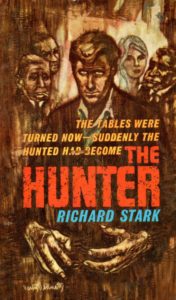 In my writing workshops I talk about three kinds of lead characters: the positive, the negative, and the anti-hero.
In my writing workshops I talk about three kinds of lead characters: the positive, the negative, and the anti-hero.
The positive lead is the traditional hero. This is someone who operates according to the shared morality of the community. It might be an ordinary man or woman who gets caught up in extraordinary circumstances (e.g., Tell No One). Or, it could be a hero with skills, like Jonathan Grave or Liam Neeson in Taken.
We root for positive leads because they represent us in the fight against evil and bad guys.
The anti-hero is someone who has been divorced from the community for some reason. They usually live according to their own code. The plot involves them being dragged into some trouble happening within the community. The story question then is: will they be reconciled to the group, or once again assume the role of outcast?
Rick in Casablanca begins the film sticking his “neck out for nobody.” Gradually he is pulled into a Nazi resistance scheme. At the end, he rejoins the community and the war effort. Ethan Edwards in The Searchers comes in from the wilderness and gets involved in finding his niece, who has been taken captive by Comanches. At the end, in one of the most memorable shots in movie history, he once again is consigned to the wilderness again.
Then there is the negative lead. This is someone who is engaged in an enterprise that offends our collective morality. The quintessential example is Ebenezer Scrooge, but also many of the leads in crime and noir fiction, such as Jack in The Vengeful Virgin, a book I wrote about last week. Indeed, some of the most popular fiction out there is about negative leads. Gone Girl anyone?
So what’s the secret to this kind of story? I’ve identified eight motifs in this regard:
- The Slow-Motion Car Wreck
You know how people are (including you). You’re on the freeway and there’s a big wreck ahead, even on the other side of the median. Flashing lights and crunched metal. You slow down a bit for a look. It’s human nature.
A book about a negative lead can be like the wreck itself, in slo-mo. I think of Scott Smith’s A Simple Plan, where the lead, his brother and a friend discover a crashed plane with a big stash of drug money. Should they report it? Or try to keep it? And when they decide to keep it, will they be able to sustain the secret without bringing disaster upon themselves and their loved ones?
I remember reading the book and actually saying out loud, a couple of times, “Don’t do that … please don’t do that!” And then they do it. I had to turn the pages, watching this wreck, hoping against hope that these guys wouldn’t descend further into the darkness.
- The Redemption Hope
Another reason to read about a negative lead is hope for their redemption. This is the way it is with Scrooge as he starts to get his angel visitations. It’s also what happens with Scarlett O’Hara in Gone With the Wind.
The key to this kind of story is to show us, early on, that the character has the capacity for moral change. With Scrooge, it begins to happen when he is taken to his boyhood past, his loneliness at school. It brings out deep emotion in Scrooge. There’s a heart in there after all! We read on to see if that heart can be warmed again.
With Scarlett, it’s her moxie, her guts, her strength. Like when she defies polite society by dancing with Rhett while she’s supposed to be in mourning. She uses her spunk selfishly most of the time. If only she can turn it in the right direction before it’s too late! If she does, frankly, we would give a damn. So we read on.
- Inner Turmoil
Sometimes, seeing what the wrong choices do to the inside of a character makes us want to find out what happens. Witnessing the emotional turmoil of a character automatically triggers our interest, because we experience it ourselves all the time.
In The Vengeful Virgin, Jack Ruxton is a knot of conflicting emotions once he falls for the alluring Shirley Angela and the two hatch a plot to murder the old man she cares for. Brewer gives us the insides of Jack throughout, as in:
Doom. You recognize Doom easily. It’s a feeling and a taste, and it’s black, and it’s very heavy. It comes down over your head, and wraps tentacles around you, and sinks long dirty fingernails into your heart. It has a stink like burning garbage. Doom. I sat up all night with the lights on. Waiting.
Passages like that kept me going, even though what Jack was doing was immoral. There’s a sort of catharsis in seeing massive inner conflict in someone else. We can put our own on hold while we’re reading!
- Comeuppance
This idea applies when we read about a real crumb. We want him to get his just desserts. He deserves to go down.
Once again, I turn to The Vengeful Virgin, because there’s a point in the middle of the book where any sympathy we might have for Jack is wiped out. His jilted lover, Grace, keeps hounding him, and getting in the way of his plans with Shirley. Grace is not a bad person, just stupidly in love with the guy.
She surprises him one night outside Shirley’s house. He’s so outraged he hits her. Hard. Staggers her. Then hits her again. Then twists her arm behind her back and shoves her into her car.
This disturbing turn makes us want to see Jack get what he deserves. (**Spoiler alert** … if you plan to read The Vengeful Virgin, skip down to #5.)
In an ending that rivals, perhaps even surpasses, Jim Thompson, Jack Ruxton, guilty of two murders, is shot by a drunken and envious Shirley, who then turns the gun on herself. She dies, but he survives, only to be arrested, tried, and sentenced to the electric chair. The last lines:
Yes, that’s how it was. Grace, she was always burning. Then Shirley and I began burning. And then the money burned. And now there was time to burn.
Then, after there was no more time, they would burn me.
- Love Conquers All
With a hat tip to Huey Lewis, there’s just something about the power of love. Especially in noir. In films like Gun Crazy and They Live By Night, doomed lovers grab our hearts even though we know it won’t end well. It can’t. In the moral universe of noir, you pay for your sins.
James M. Cain’s classic The Postman Always Rings Twice bonds us to the murderous couple. Drawn first by lust, by the time the book gets to the end, the two are truly part of each other. There’s poignancy on the last page as Frank Chambers awaits his appointment with the electric chair (Old Sparky is a familiar last stop in these books!):
Here they come. Father McConnell says prayers help. If you’ve got this far, send up one for me, and Cora, and make it that we’re together, wherever it is.
- At least he’s better than the other crumbs
One of the hardest of the hardboiled writers was Richard Stark, pen name of prolific author Donald Westlake. He created Parker—thief, killer, heist man. Not a shred of sentimentality in this guy. So why do we root for him? In the first book, The Hunter, Parker has been double-crossed and left for dead after a heist. He goes after the money he’s owed, taking on “the outfit” (the crime syndicate) to get it back. Not the whole stash, you understand. Just his half of it.
In other words, compared to the other criminals involved, Parker’s cause is “just.” It’s a remarkable feat, which is why no less than seven movies have been made about this character (the two best are Point Blank and Payback}.
- Such a charmer
Tom Ripley, the protagonist of several novels by Patricia Highsmith, has been described as “charming, literate, and a monster” (Roger Ebert). Also “a likable psychopath.” Talk about a challenge! Yet Highsmith pulls it off.
- Will They Get Away With It?
Finally, we sometimes read or watch a criminal caper story and actually find ourselves hoping, just a little (or maybe even a lot), that the negative leads get away with it.
My favorite film example is The Asphalt Jungle. Directed by John Huston, the film is about a group of thieves coming together to pull off a big heist. There’s a sympathy factor in operation for each of these desperate men, and you find yourself pulling for them even as the cops pull the net tighter and tighter. It’s really one of the great crime films of all time, with a memorable early appearance by Marilyn Monroe.
Okay! Let’s open this up. What’s your favorite book or movie about a negative lead? What made it work for you?
***
BTW, if you want to get in on the ground floor of a series with a hero, try ROMEO’S RULES

